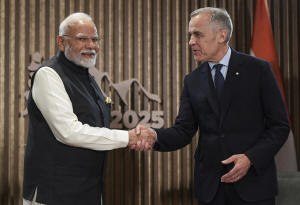India and Canada to restore diplomatic services nearly two years after
killing of Sikh separatist
[June 18, 2025]
By RAJESH ROY
NEW DELHI (AP) — India and Canada agreed to restore diplomatic services
nearly two years after Ottawa accused New Delhi of alleged involvement
in the killing of a Sikh separatist leader, which turned into a row
straining relations between the two countries.
The announcement was made after Indian Prime Minister Narendra Modi and
his Canadian counterpart, Mark Carney, met Tuesday on the sidelines of
the Group of Seven summit in Kananaskis, Alberta.
“The leaders agreed to designate new high commissioners, with a view to
returning to regular services to citizens and businesses in both
countries,” a statement from Carney’s office said.
High commissioners are senior diplomats, representing their country’s
interests and fostering relationships with the host nation.
Modi and Carney reiterated the importance of a bilateral relationship
based on mutual respect and a commitment to the principle of territorial
sovereignty, according to the statement. They also discussed further
collaboration in several sectors, including technology, digital
transition, food security, and critical minerals.
Meanwhile, India's foreign ministry underscored the importance of
restarting senior ministerial engagements to “rebuild trust and bring
momentum to the relationship.”

Carney’s predecessor, Justin Trudeau, shocked the world in September
2023 after announcing in Parliament there were credible allegations
about India’s link to the killing of Hareep Singh Nijjar near Vancouver.
New Delhi vehemently denied the allegations and accused Trudeau’s
government of harboring extremists.
The Indian government had declared Nijjar a terrorist in 2020 under a
law meant to suppress dissent. The Sikh independence advocate was a
prominent member of the Khalistan movement, banned in India, to create
an independent Sikh homeland. He was seen as a human rights activist by
Sikh organizations.
Ties between the two countries continued to worsen and in October, India
expelled Canadian diplomats and withdrew its high commissioner and other
officials from Canada. Ottawa retaliated by dismissing Indian diplomats
and accusing the Indian government of an intensifying campaign against
Canadian citizens, a charge New Delhi denied.
[to top of second column]
|

India's Prime Minister Narendra Modi, left, and Canada's Prime
Minister Mark Carney shake hands during a meeting at the G7 Summit
in Kananaskis, Alberta, Tuesday, June 17, 2025. (Darryl Dyck/The
Canadian Press via AP)

India's anxieties about Sikh separatist groups have long strained
its relationship with Canada, where some 2% of the population is
Sikh.
Modi Calls Trump
As Trump abruptly left the G7 summit, Modi had a detailed phone
conversation with the U.S. president and shared India’s military
response against Pakistan last month following the killings of 26
innocent people, mostly Hindu men, in Indian-controlled Kashmir,
foreign secretary Vikram Misri said.
In recent weeks, Trump had claimed to have brokered a ceasefire
between India and Pakistan and offered trade concessions in part to
make the nuclear-armed rivals reach an agreement after shooting at
each other for days, which was checkmate by New Delhi. Trump had
also proposed mediation over Kashmir.
In a statement, Misri said Modi clarified to Trump that India had
never in the past accepted nor would it encourage in the future a
third-party mediation over the simmering dispute of Kashmir, a
Himalayan region claimed by both India and Pakistan in its entirety.
Misri said Modi made it clear to Trump that during multiple talks
held between New Delhi and Washington senior officials amid the
ongoing military conflict, there was no mention of a trade deal or
the U.S. mediation over Kashmir.
The talks to stop military actions were held directly between the
military leaders of India and Pakistan through existing channels,
Misri said.
All contents © copyright 2025 Associated Press. All rights reserved
 |